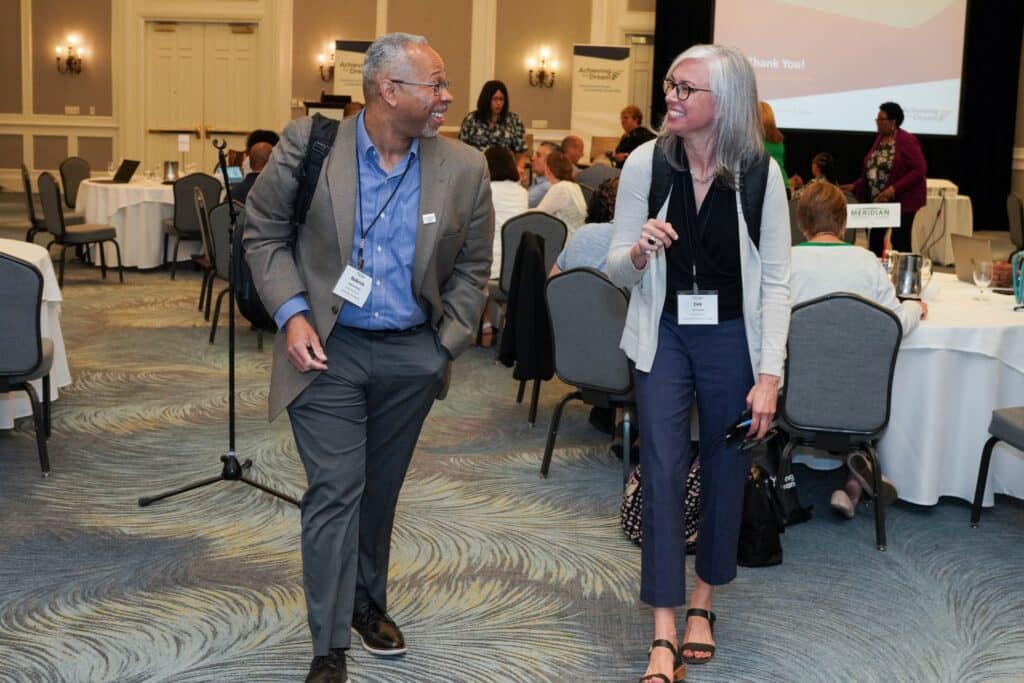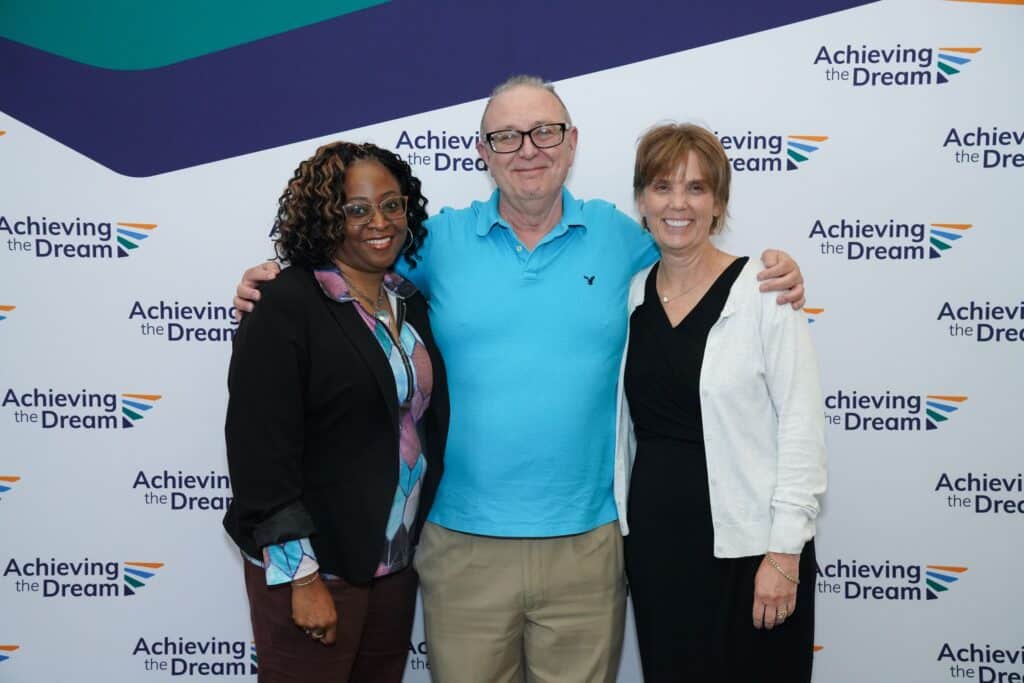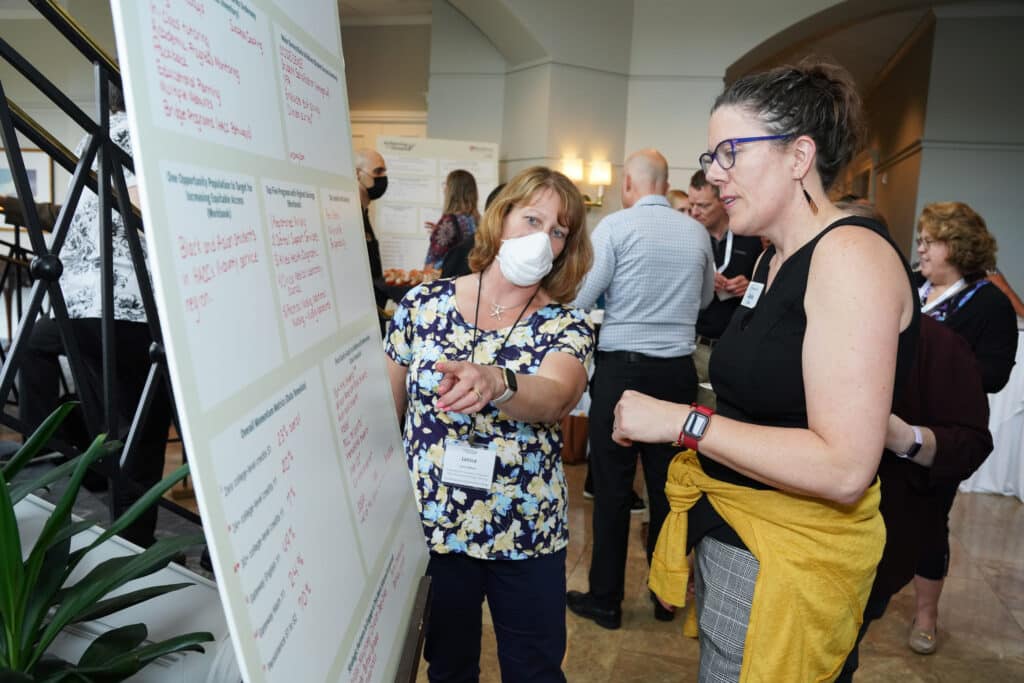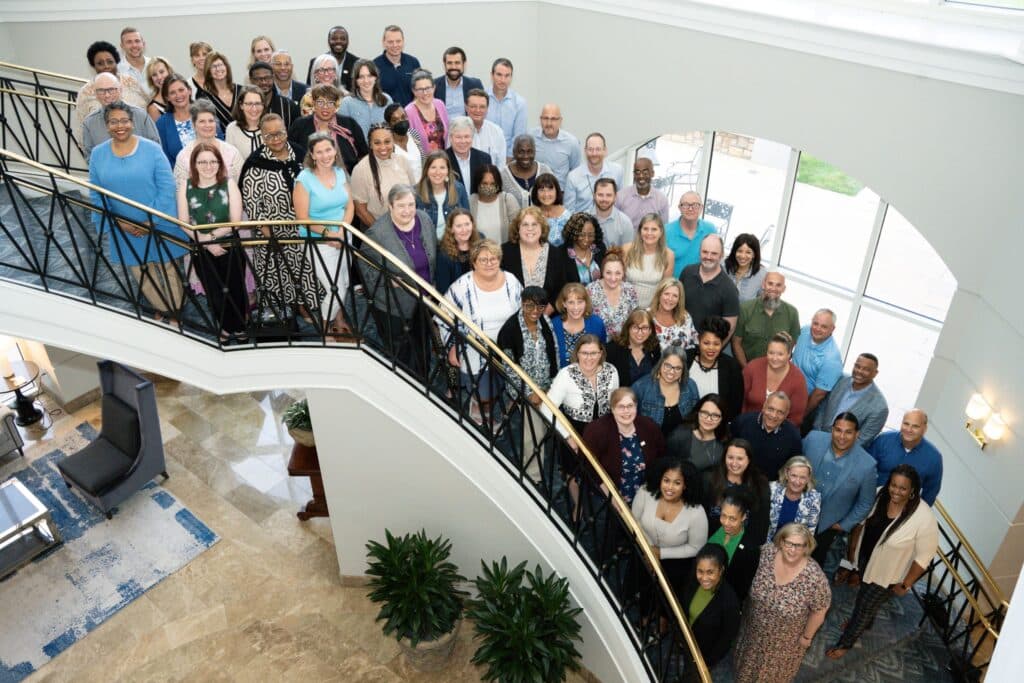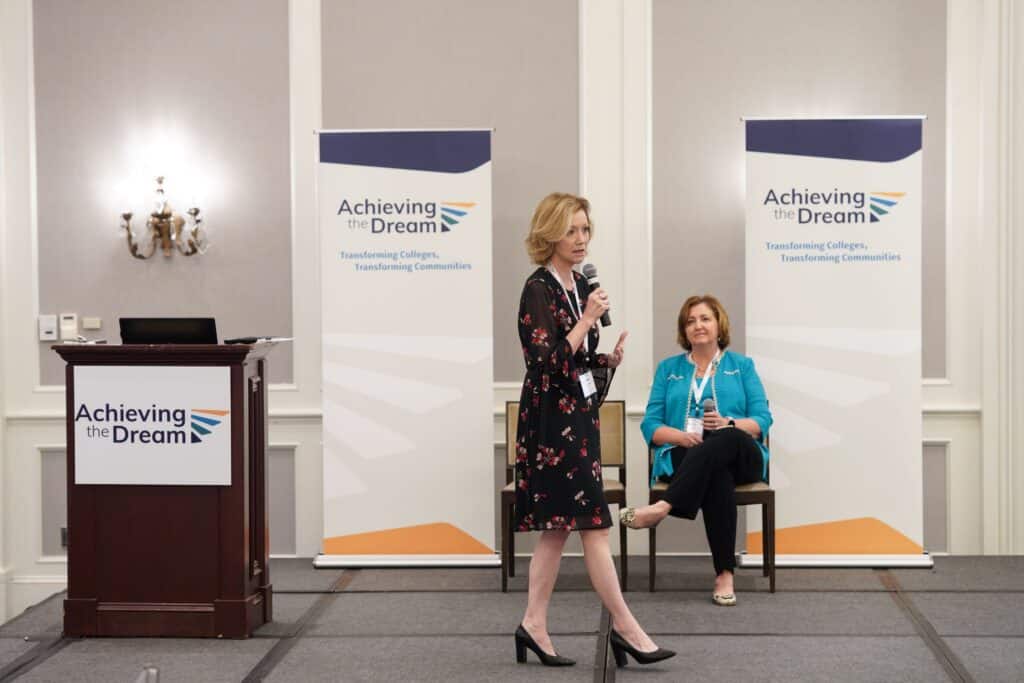This June, teams from the seven newest colleges in the ATD Network convened in Charlotte, North Carolina, for the 2022 Kickoff Institute, an annual event to prepare new cohort colleges for their first three years with ATD.
Joined by over two dozen ATD staff and coaches, the colleges attending Kickoff were as follows:
- Brookdale Community College (NJ)
- Central Carolina Technical College (SC)
- Community College of Aurora (CO)
- HACC, Central Pennsylvania’s Community College (PA)
- Meridian Community College (MS)
- Northwood Technical College (WI)
- Reynolds Community College (VA)
Each college sent a cross-functional team of leaders, faculty, institutional researchers, student services staff, and other key players in colleges’ efforts to better serve their students. Over three days of peer learning, team planning, and networking, the 2022 cohort began laying foundations of transformation for their institutions and their communities.
Transforming colleges to transform communities
ATD welcomed the 2022 cohort to Kickoff in an opening plenary session that introduced college team members to ATD’s vision, mission, and equity principles. In her opening remarks (delivered virtually due to an injury), ATD’s president and CEO Dr. Karen A. Stout outlined the three core tenets that support the organization’s new vision statement: equity, access, and community vibrancy. These tenets would become grounding themes for the workshops and planning sessions for college teams throughout the institute.
“As you embark on your ATD journey, I challenge you to embrace this moment, this responsibility. Every single person at your institutions has the power to affect every student’s life for the better,” Dr. Stout said.
ATD leaders then outlined how equity, teaching and learning, and holistic student supports — three central areas of ATD’s work — combine to produce sustainable, scalable student success initiatives that benefit more than just students.
“Reform is not just an intervention or a series of interventions,” said Dr. Monica Parrish Trent, vice president of network engagement, “but an effort to transform our whole institutions and, as a result, our communities.”
Transformation by the numbers
On day one, college teams spent two hours with their new ATD coaches, filling out workbooks and data sheets that would help the first year of their transformation journey begin to take shape. Afterwards, all participants gathered for a reception where colleges’ data, challenges, goals, and ideas were put on display.
During the “Data Walk,” a new installment of the annual Kickoff Institute, representatives from each college had a chance to talk to each other and to see key data points from every college written out on large poster boards. Teams had identified overall momentum metrics (such as the percentage of students with zero college-level credits after one semester or success rates in gateway English and math courses), priority equity gaps to target, strategic partners to engage in their transformation work, and other key data points.
The data boards highlighted how, while similarities exist across colleges, each institution was developing unique goals that responded to the specific needs of their community. Northwood Technical College, for example, identified Native American students as a target population to increase equitable access. And the Community College of Aurora indicated their goals to partner with more workforce programs in order to support adult learners.
Bryan May, director of research and institutional effectiveness at Central Carolina Technical College, said that while the “gravity” of a college’s data can be hard to convey outside of the institutional research department, this process brought multiple teams together in a way that gave more meaning and urgency to the data.
Jennifer Billman, associate professor of biology and assessment and coordinator of academic affairs at HACC, Central Pennsylvania’s Community College, walked around the room with a notepad, taking copious notes. She said she enjoyed the opportunity to look at creative solutions from other colleges that faced similar challenges.
What it means to be part of the ATD Network
When a college joins the ATD Network, it doesn’t just gain access to ATD’s expert staff and coaches: Network institutions join a nationwide community of peer learning, shared resources, and mutual support.
Tim Merrill, associate vice president of institutional research and effectiveness at Reynolds Community College, valued the insight he knew his team stood to gain from other colleges in the ATD Network. “We can borrow from them,” he said. “We don’t have to reinvent solutions.”
On Wednesday, the Kickoff teams broke into groups for a period of concurrent sessions. In a presentation entitled “Building a Comprehensive Student Success Agenda,” Vicki Van Hise, executive director of student access services at HACC, shared that she’d found value in embarking on this process alongside six other college teams. “We’re learning we’re not the only ones,” she said, as leaders and faculty in the session discussed common challenges in data, student supports, equity, and access.
Equity is a whole-college commitment
By the final day of Kickoff, college teams had begun outlining their next steps, but many had the same questions on their minds: How am I going to share this work with the rest of my institution? How do I get faculty involved in — and excited about — whole-college transformation?
In the closing plenary session, presidents from two Network colleges in North Carolina shared how their own teams had answered some of these questions in their years working with ATD.
A sustainable commitment to equity, access, and community must be embedded in a college’s culture, said Dr. Janet Spriggs, president of Forsyth Technical College. In its three-and-a-half years as part of the ATD Network, Forsyth has increased overall student success rates, reduced equity gaps by 15 percent, and launched a new vision statement that positions the college as “a catalyst for equitable economic mobility, empowering lives, and transforming communities.”
Dr. Kandi Dietemeyer, president of Central Piedmont Community College, told Kickoff participants that she encouraged her college staff and faculty to think of themselves as partners in the college’s transformation journey. “Change leadership is key,” Dr. Dietemeyer said. “Everybody on campus is a leader and makes a difference to student success.”
With tools already added to their belts, a deeper understanding of institutional data, and a new community of peers in the ATD Network, the 2022 cohort left the Kickoff Institute with energy and purpose.
Laura Longo, director of institutional research and evaluation at Brookdale Community College, said that while the Kickoff Institute may not have changed any of the college’s goals, it had helped them identify specific areas to focus on — especially where equity is concerned — as they developed their new strategic plan.
Lowell Martin, director of the Student Success Center at Meridian Community College, reflected on the eye-opening sessions and workshops of the last few days. He knew that when his team returned to Mississippi, they might meet some resistance, but he was committed to pursuing more equitable outcomes for Meridian’s students. “I look forward to the challenge,” he said.
